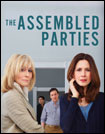
The Assembled Parties
Opening Night: April 17, 2013
Closing: July 28, 2013
Theater: Samuel J. Friedman
THE ASSEMBLED PARTIES welcomes us to the world of the Bascovs, an Upper West Side Jewish family in 1980. In a sprawling Central Park West apartment, former movie star Julie Bascov and her sister-in-law Faye bring their families together for their traditional holiday dinner. But tonight, things are not usual. A houseguest has joined the festivities for the first time and he unwittingly – or perhaps by design – insinuates himself into the family drama. Twenty years later, as 2001 approaches, the Bascovs’ seemingly picture-perfect life may be about to crumble. A stunning new play infused with humor, THE ASSEMBLED PARTIES is an incisive portrait of a family grasping for stability at the dawn of a new millennium.
READ THE REVIEWS:
April 17, 2013
Early in The Assembled Parties, a visitor swoons over the elegant 14-room Central Park West apartment of his hosts. “It’s like the sets of those plays you love,” he tells his mother on the phone. “With the breezy dialogue. They sort of talk that way and everybody’s unbelievably nice and, like, gracious and happy. It’s like you go to New York and you look for New York but it isn’t there? But it’s here.
READ THE REVIEWApril 17, 2013
Richard Greenberg delighted and surprised Broadway in 2003 with his Tony-winning Take Me Out, an edgy play plotted around a Major League baseball player coming out of the closet. The playwright’s latest effort, the Manhattan Theatre Club’s The Assembled Parties, doesn’t quite rock the genre in the same way — it’s a talk-heavy New York City drama concerning the power of familial bonds. But Parties feels at home on Broadway, gets a lot of laughs (as well as some tears), and it’s as close to bullet-proof as they come on the Great White Way these days. (It’s also a vastly more successful play than Greenberg’s recent adaptation of Breakfast at Tiffany’s.)
READ THE REVIEWApril 17, 2013
Richard Greenberg’s elegantly moving The Assembled Parties is somewhere between a slice of life and a slice of mille-feuille. Unfolding in a palatial Upper West Side flat, first in 1980 and later in 2000, the play is a Jewish family drama by way of The New York Review of Books. Characters in Greenberg’s word-besotted world mix Yiddishisms with terms like aleatory, ambrosial and artesian—just to skim the A-list—and drop names like Louis Auchincloss and Mary Wollstonecraft. (A ruby-red necklace is described as a “rutilated, asterized treasure.”) The theatrical nature of this style is more or less explicit: “You would love the apartment, Mom,” says a young visitor, Jeff (the yeomanly Shamos), in a flustered phone call to his mother. “It’s like the sets of those plays you love. With the ‘breezy dialogue.’ ” A brisk draft of intelligence blows straight through the script, tempering moments of sentiment with astringency and surprise.
READ THE REVIEWApril 17, 2013
The intermission at “The Assembled Parties” takes 20 years. No, really: The first act begins and ends in a Manhattan apartment on Christmas Day in 1980, and the second opens in the same place on Christmas Day in 2000. It is the best time travel right now on Broadway.
READ THE REVIEWApril 17, 2013
There are tales, still told by the old ones of Broadway, of a time when Charm — with a capital C — was a cardinal virtue in the theater. It was an attribute that made plain actresses beautiful, and turned short, stocky men into matinee idols. Entire plays, it is said, were written in celebration of those who possessed this enviable trait, works filled with airy, tickling dialogue and the accouterments of tasteful wealth. To my great surprise, a brand-new version of such a play has materialized at the Samuel J. Friedman Theater, and it is, in a word, charming.
READ THE REVIEW




















